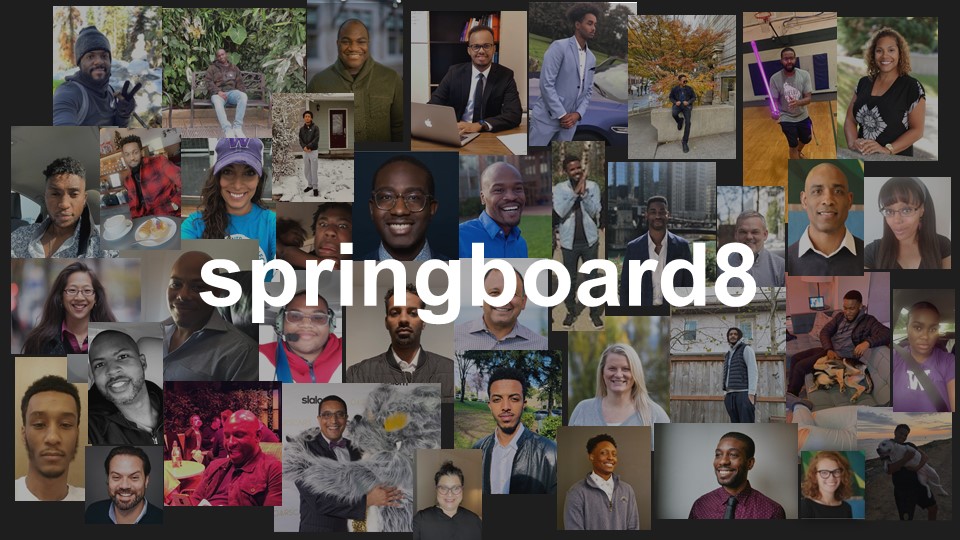Pilot program prepares Black male students for success

Community colleges across the nation face the historic inequity that underserved students of color, particularly Black males, are much less likely to graduate or to complete their programs on time than their peers. This is the result of racism, generational poverty, unequal access to resources, and systemic barriers built into the education system.
But a pilot program that started this winter quarter at Seattle Central College aims to take on that problem head on. The Springboard8 program is a new initiative that provides coaching, mentoring, and financial assistance to a cohort of Black male students at the college, to help them graduate on time and to build the connections and networks to succeed afterwards.
The program is a partnership between Seattle Central College and consulting firm Slalom. Slalom provides coaches and support to the students, with an emphasis on skills that help students to succeed in school and to pursue careers or businesses of their own. The program also gives the students a group of peers with shared experiences, who can support and guide each other through their journey at the college.
The idea for the partnership arose last year, soon after the murder of George Floyd by a Minneapolis Police officer sparked a national reckoning about systemic racism. Slalom CEO Brad Jackson spoke to Seattle Central College President Sheila Edwards Lange about ways to continue making his company an anti-racist organization. Edwards Lange cut to the point, challenging him to put his ideas into action by helping students directly.
“We wanted to be a part of creating something meaningful that brings people together, that also brings people into our industry from outside the traditional path,” said Slalom Senior Consultant Allie Siegel, who directs the Springboard8 pilot program. “(Jackson) was already planning on doing more, and the timing was just right.”
“Slalom didn’t just come to us with an idea to implement or give us money and ask us to come up with an idea on our own,” said Jessica Norouzi, executive director for the Office of Strategic Partnerships at Central. “Instead, they worked side by side with us and listened carefully to the needs of the college and students, and showed a genuine interest in partnering with us to address systemic racial barriers.”
By the end of the summer, the college and Slalom had designed a coaching and support program for Black male students. Black men have the lowest rate of completion at Seattle Central, a statistic that is mirrored by community colleges nationally. The college had already made it a priority to remove systemic barriers to the success of Black males, because these efforts will help all other students to achieve their goals at the college.
The first cohort of 20 students began to meet (virtually) at the start of winter quarter 2021. It took a while to get the formula right and to earn the trust of the students in the program. Some students dropped out; others joined later. But after a few weeks, the program found its footing.
Coaches from Slalom, including Black male team members, helped lead the regular meetings of the group and to provide support. The emphasis was on helping students to share their experiences with each other, and to build a sense of shared community.
Students got advice on everything from how to apply to financial aid, budgeting, to how to begin thinking about starting a business of their own. They also got financial incentives to stay in the program and to reach academic milestones, and tuition assistance to help with the costs of college.
“They have a genuine mission and desire to have an impact on our lives as Black students. You can tell they are driven to have an impact on us and our community,” said Myron Curry, a Seattle Central student in the IT Networking design and administration program, and a member of the Springboard8 pilot class.
Curry said the most useful part of the program has been the support of his peers and the safe space to share and be vulnerable.
“We talk about our life stories, share experiences. The meetings are usually an hour, but that never seems like enough time,” Curry said. “We are actually working together, and that’s the best part for me.”
The learning experience worked both ways. Allie Siegel said that working with the Springboard8 cohort has shown her that there are many amazing people out there, with valuable experiences and knowledge outside of the traditional student path, who have much to offer to business and industry and only need a little support to succeed.
“I hope that this model can help inspire more professionals to pay it forward and give back, to become a coach or a mentor,” she said.
The plan now is to finish the pilot, evaluate the results, and bring in more industry sponsors so that it can become a sustainable and permanent program at Central, and perhaps expand to other colleges.